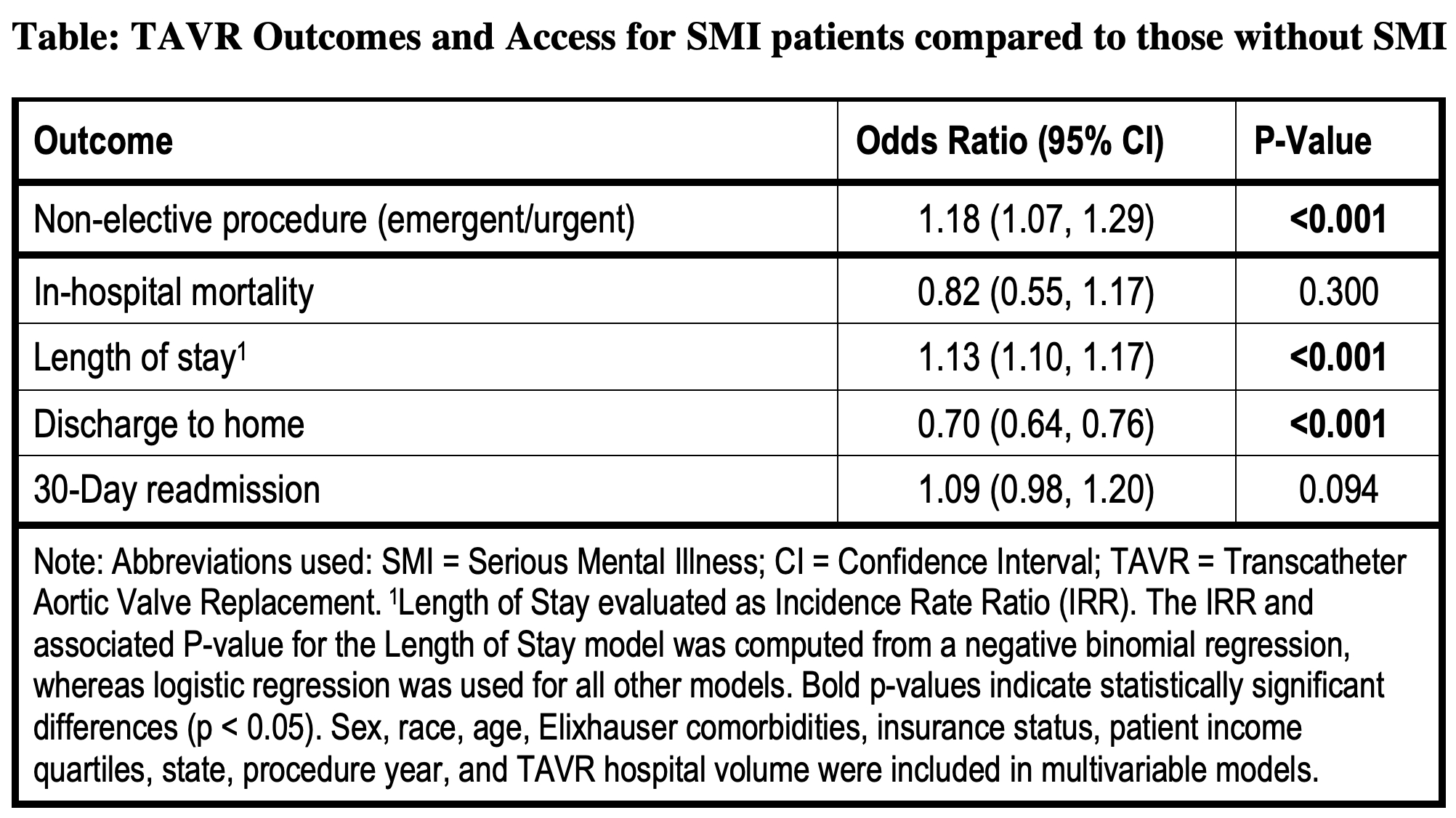Final ID: MDP1003
Effects of Serious Mental Illness on Transcatheter Aortic Valve Replacement (TAVR) Outcomes and Access
Abstract Body (Do not enter title and authors here): Introduction
Serious mental illness (SMI) is associated with higher risk of immediate procedural complications after transcatheter aortic valve replacement (TAVR), including myocardial infarction, major bleeding, and acute renal failure. There is limited data on the impact of SMI on in-hospital mortality and 30-day readmissions. We aimed to evaluate access to and outcomes after TAVR for patients with SMI compared to those without SMI.
Methods
We performed a retrospective cohort study of adults aged ≥18 years who received TAVR with a primary diagnosis of aortic stenosis using the Healthcare Cost and Utilization Project State Inpatient Database and State Ambulatory Surgery and Services Database in FL, MD, VT, UT, and WI (2016-2019). SMI was defined using ICD-10 codes for schizophrenia spectrum, mood, or anxiety disorders. Primary outcomes include in-hospital mortality, 30-day readmission, length of stay, and routine discharge. The secondary outcome was access type (elective vs. urgent/emergent). Multivariable logistic and negative binomial regression models with adjustment for patient demographics, co-morbidities, and hospital characteristics were used to examine outcomes.
Results
Of 21,905 patients who underwent TAVR for aortic stenosis, 2,954 (13.5%) patients had SMI. Overall, 16,762 (76.5%) of patients had elective procedures. Patients with SMI were more likely to be female (59% vs. 41%, p<0.001) and have 3+ co-morbidities (91% vs. 77%, p<0.001) but had similar income quartile distribution (p=0.18), home-to-hospital distance (p=0.09), and clinically similar hospital TAVR volume over the study period (435 vs. 430, p=0.01). After adjustment for potential confounders, access to and outcomes of TAVR differed significantly by SMI status (See Table).
Conclusions
SMI patients had increased odds of emergent access to TAVR. After TAVR, SMI patients had longer length of stay and were less likely to be discharged to home. These findings suggest increased discharge planning may be required for patients with SMI after TAVR and highlight the need for additional investigation into barriers to elective TAVR in this vulnerable population.
Serious mental illness (SMI) is associated with higher risk of immediate procedural complications after transcatheter aortic valve replacement (TAVR), including myocardial infarction, major bleeding, and acute renal failure. There is limited data on the impact of SMI on in-hospital mortality and 30-day readmissions. We aimed to evaluate access to and outcomes after TAVR for patients with SMI compared to those without SMI.
Methods
We performed a retrospective cohort study of adults aged ≥18 years who received TAVR with a primary diagnosis of aortic stenosis using the Healthcare Cost and Utilization Project State Inpatient Database and State Ambulatory Surgery and Services Database in FL, MD, VT, UT, and WI (2016-2019). SMI was defined using ICD-10 codes for schizophrenia spectrum, mood, or anxiety disorders. Primary outcomes include in-hospital mortality, 30-day readmission, length of stay, and routine discharge. The secondary outcome was access type (elective vs. urgent/emergent). Multivariable logistic and negative binomial regression models with adjustment for patient demographics, co-morbidities, and hospital characteristics were used to examine outcomes.
Results
Of 21,905 patients who underwent TAVR for aortic stenosis, 2,954 (13.5%) patients had SMI. Overall, 16,762 (76.5%) of patients had elective procedures. Patients with SMI were more likely to be female (59% vs. 41%, p<0.001) and have 3+ co-morbidities (91% vs. 77%, p<0.001) but had similar income quartile distribution (p=0.18), home-to-hospital distance (p=0.09), and clinically similar hospital TAVR volume over the study period (435 vs. 430, p=0.01). After adjustment for potential confounders, access to and outcomes of TAVR differed significantly by SMI status (See Table).
Conclusions
SMI patients had increased odds of emergent access to TAVR. After TAVR, SMI patients had longer length of stay and were less likely to be discharged to home. These findings suggest increased discharge planning may be required for patients with SMI after TAVR and highlight the need for additional investigation into barriers to elective TAVR in this vulnerable population.
More abstracts on this topic:
A Comparative Study Of Social Determinants, Hypertension, And Life Essential Factors In Alabama And Colorado From The 2021 Behavioral Risk Factor Surveillance System
Chukwunyere Chibuike, Owuor Kevin
A 50% or Greater Reduction in LDL-Cholesterol Is Associated with Improved Long-Term Outcomes and Lower Health Care Utilization After Myocardial Infarction - a SWEDEHEART studyReitan Christian, Watanabe Alexandre, Bash Lori, Galvain Thibaut, Arnet Urs, Jernberg Tomas

